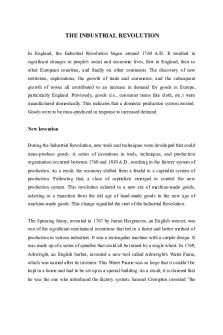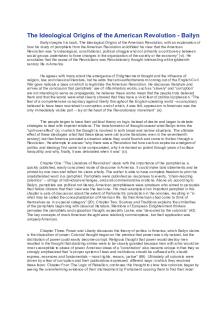5-21 (The American Revolution) 2 PDF

| Title | 5-21 (The American Revolution) 2 |
|---|---|
| Course | History Workshop |
| Institution | Auburn University at Montgomery |
| Pages | 1 |
| File Size | 107.9 KB |
| File Type | |
| Total Downloads | 88 |
| Total Views | 158 |
Summary
Lecture Notes...
Description
It was also a war of empire fought outside of North America New languages of freedom raised questions about political authority, representation, individual rights, settlement and property, and enslavement. - Factors leading to War for Independence: French and Indian War (Seven Years War), Pontiac’s War, Regressive taxes, Boston Massacre, Use of “new languages of freedom” in pamphlets, Protests and revolts (i.e. Boston Massacre and Tea Party). - Seven Years’ War (1756-1763) and Pontiac’s War (1763-1764): Caused Great Britain to raise taxes to pay for wars; Expansion caused political tension by spreading forces to thin and potential treaty violations; Seven Years’ War fought between France, French colonists, and indigenous allies against England, British colonists, and Iroquois Confederacy; The Ottawa, Delaware, Seneca, Huron, and other indigenous groups waged a military campaign to take control of British forts. The Crown settled with Pontiac and others—confirming land rights to indigenous groups west of the Appalachians; Exposed clashing interests between colonists and crown; settlers felt betrayed by agreement with Pontiac and indigenous groups; Wars drained English economy, leading to Parliament passing tax laws. - British Prime Minister George Grenville: British sought to impose taxes on colonies to pay for war and to help maintain empire (disproportionately hurt poor people, reduced trade, led to protests, illustrated that Parliament could exercise power over colonists). Tightens customs laws and enforcement. Smuggling cases shifted to vice-admiralty courts where judges preside without juries. - Boston Massacre (March 5, 1770): Colonists resented presence of military; Mob attacks soldiers; Five protesters die, including a man of Black and indigenous descent, Crispus Attucks - Thomas Paine & Common Sense: Thomas Paine published Common Sense in January 1776. Addressed common folks in direct prose. Called for immediate independence, union of thirteen colonies, and republican government. Focused colonists’ anger on Crown. Created a sense of shared identity through struggle (caused a shift of colonial political opinion). Pushed for immediate revolution. Blamed Parliament for taxes. Claimed king and aristocrats were exploiting the colonists. * Summary: - Keys to American Victory: Colonists allied with France, Spain, and the Netherlands. French and Spanish enlisted free Blacks in the Caribbean while the English did not. ‘Patient war’ tactics. Smallpox inoculation for troops. Peace treaty negotiated in 1783. Only 13 colonies joined the war; Caribbean island colonies as well as Nova Scotia, Prince Edward Island, and Quebec chose to remain British. - The Revolutionary War Beyond North America in the West Indies (Caribbean): France and England tried to capture each others’ sugar-rich island colonies. British were lightly fortified, so French possessed the advantage. Spain enters the war against the British in April 1779. French and Spanish enlisted and armed free blacks while England did not. England retains control over colonial possessions in West Indies, but at cost. - Outcomes: Republican form of government. The Constitution was drafted in 1787 and adopted in 1789. The new structure balanced federal authority against that of the constituent states. Power was divided between presidential, legislative, and judicial branches. The Bill of Rights (1791) guaranteed certain liberties for citizens. Push for women’s rights. Call for equal representation for Africans and abolition of slavery. - Abigail Adams: wife of John Adams; outspoken for women’s rights. • •
* Takeaways: • New languages of freedom (Liberalism) emerge in response to limitations of monarchy and mercantilism and inspire revolution in North America. • The conflict is a civil war; one to maintain empire for the British and a revolutionary one for independence for the colonists. • Revolution raises questions about government, economics, freedom, and slavery....
Similar Free PDFs

The American Revolution summary
- 5 Pages

5-21 (The American Revolution) 2
- 1 Pages

The French and American Revolution
- 10 Pages

American Revolution quiz
- 2 Pages

The beats 2 - American lit
- 4 Pages

THE Industrial Revolution
- 4 Pages
Popular Institutions
- Tinajero National High School - Annex
- Politeknik Caltex Riau
- Yokohama City University
- SGT University
- University of Al-Qadisiyah
- Divine Word College of Vigan
- Techniek College Rotterdam
- Universidade de Santiago
- Universiti Teknologi MARA Cawangan Johor Kampus Pasir Gudang
- Poltekkes Kemenkes Yogyakarta
- Baguio City National High School
- Colegio san marcos
- preparatoria uno
- Centro de Bachillerato Tecnológico Industrial y de Servicios No. 107
- Dalian Maritime University
- Quang Trung Secondary School
- Colegio Tecnológico en Informática
- Corporación Regional de Educación Superior
- Grupo CEDVA
- Dar Al Uloom University
- Centro de Estudios Preuniversitarios de la Universidad Nacional de Ingeniería
- 上智大学
- Aakash International School, Nuna Majara
- San Felipe Neri Catholic School
- Kang Chiao International School - New Taipei City
- Misamis Occidental National High School
- Institución Educativa Escuela Normal Juan Ladrilleros
- Kolehiyo ng Pantukan
- Batanes State College
- Instituto Continental
- Sekolah Menengah Kejuruan Kesehatan Kaltara (Tarakan)
- Colegio de La Inmaculada Concepcion - Cebu









